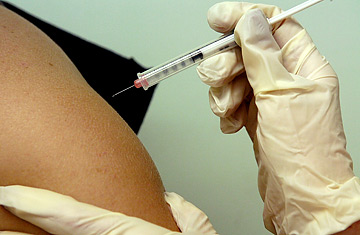
HPV Vaccine
HPV is an increasingly common sexually transmitted disease and one that scientists say is linked to 70% of all cases of cervical cancer. Gardasil, the first vaccine to fight cancer, was approved by the Food and Drug Administration last June. The CDC says the vaccine has been tested, is safe and goes a long way toward preventing the deadly cancer which is estimated to have affected 9,710 women in 2006, killing 3,700.
But not everyone is happy with the move by state legislators to make the vaccines mandatory.
"I had no idea that this would engender the kind of uproar that it has," says Kentucky state Rep. Kathy Stein, a Democrat who this month became the Bluegrass State's first woman to chair the powerful House Judiciary Committee. "Some parents might be cautious before giving a vaccine that is fairly new to a child and I can understand that. But many, many conservative groups — and I won't say Christian groups, but many of them are — say it is the parents who have a right to decide what happens to [their] children. They argue that if you are good folks who raise your daughter to be chaste and pure until she reaches her marriage bed, she won't need this."
The legislation has not yet become law in any state, though it has come closest in Michigan, where it passed the senate before being narrowly defeated in the state house last month.
Sarah Wells, senior public policy director for Women in Government, which champions the mandatory vaccination legislation, said that in addition to Kentucky and Michigan, at least eight other states and the District of Columbia are weighing making the vaccine mandatory this year. "We know that cervical cancer is 100% preventable, we know what causes it," Wells said. "We also know that by taking this vaccine young women can prevent two strains of HPV that together cause 70% of all cervical cancer cases. That's why we have made it one of our priorities."
The Home School Legal Defense Association, a national legal and political advocacy group that fought the bill in Michigan and is opposing the effort in Kentucky and elsewhere, says the bill is simply too intrusive.
"It's very offensive to parents," said Christopher Klicka, a senior attorney with the legal association. "They have to have their young daughters, as young as 10, immunized against a sexually transmitted disease. The home-schoolers, some of them have religious objections. But others just think it is misguided. There may be a real problem out there, but they should deal with the kids that have the problem, and not all the innocent children who wouldn't even think about anything close to sexual contact. It simply oversteps the line."
He added that many parents don't trust the vaccines. "The science is still out," he said.
Curtis Allen, a spokesman for the CDC, said the vaccine was included for the first time in its annual schedule of recommended childhood immunizations, released earlier this month. The advisory group that publishes the scientific documents about the recommendation is still working on the language for a final document, which he said should be released in about six weeks. "But it's a pretty straightforward recommendation," Allen said. He added that girls "ages 11 to 12, and downward to as young as 9 and up to 26, should get the vaccine."
The American Cancer Society and other agencies say preventing HPV can greatly eliminate the chance of developing cervical cancer. The Kentucky legislation, similar to the proposals in other states, would require girls who are middle-schoolers at public or private schools — including home-schooled children — to be vaccinated within two weeks of the start of the school year. The treatment typically requires three shots, and is administered over about a six-month period.
Wells and other supporters of the mandatory vaccinations point out that states have been requiring vaccinations for schoolchildren for decades, including current laws that require immunization against hepatitis B, influenza and other diseases.
Wells also points out that all 50 states — and Kentucky is no exception — permit exemptions to mandatory vaccinations under some circumstances. In Kentucky, for instance, the law says parental objections on health or religious grounds must be honored.
The issue is getting a lot of attention this year, in part because women like Stein have been elevated to powerful positions within the state legislatures. Wells said newly elected majority floor leaders in both the Indiana and Illinois senates have made women's health care — and cervical cancer prevention — priorities.
Stein said she planned to introduce the bill before she was elevated to her powerful committee chairmanship, and said the controversy over the bills are obscuring what's most important: That the vaccines work.
"This is something people are overlooking. For decades, we have talked longingly about finding a vaccination against cancer. What would you say if we found a vaccine against lung cancer? Colon cancer? Prostate cancer? You'd say, I want to get that."
